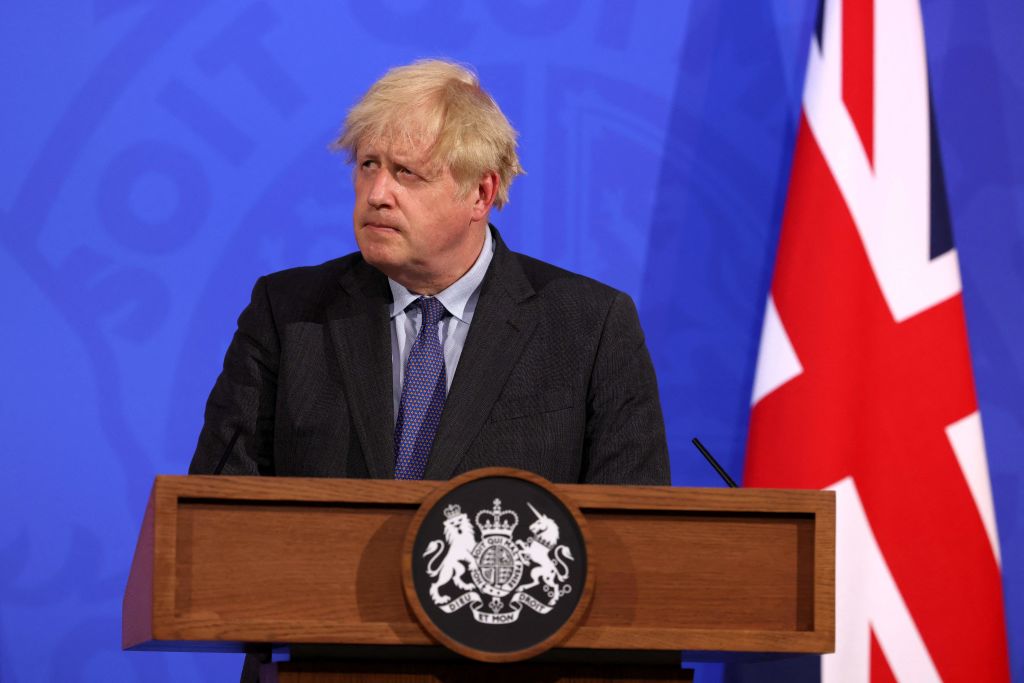When Boris Johnson announced that unlocking would be guided by ‘data not dates’ he handed detractors ample scope for derision and defiance. In the four months since, lockdown critics have rightly insisted that he uphold the slogan and accelerate a roadmap, designed to move at such a glacial speed, that it risked fraying the DNA of our economy and permanently crushing our joie de vivre.
Why did we spend Easter isolated from loved ones? April in wintry beer gardens? Why did we roll out the vaccine at phenomenal pace only to keep restrictions in place as the number of Covid deaths hit single digits?
Contrary to expectation, however, that mantra was probably a good hill to die on. Denouncing Boris Johnson’s decision to rubber-stamp the roadmap delay and pencil in 19 July as our new ‘Freedom Day’ is awkward now that the top-line stats are so unnerving. 7,000 infections on consecutive days for the first time since late February. A strain so transmissible that it now makes up 91 per cent of Coronavirus cases in the UK. An R rate among the highest in Europe.
But if the Prime Minister is as fixated on data as he professes, where are the cost-benefit analyses or the impact assessments? An estimated eight in ten of us now have antibodies. It’s also estimated there will be a two per cent hit to GDP from this four-week postponement.
Where are the cost-benefit analyses or the impact assessments?
What of the 25,000 licensed venues that have still not reopened and cannot do so until the government gets rid of the rule of six? We all need a better sense of the trade-offs, not least the 25 per cent of staff in arts and entertainment still on furlough.
But numbers in isolation are virtually meaningless. What matters is the government’s objective. It feels like the rules have been changed but the public no longer knows what sport is being played. If we’re not squashing the sombrero to protect the NHS then are we pursuing zero Covid?
Back in 2016, the MIT Media Lab created an online experimental platform designed to explore the moral dilemmas faced by autonomous vehicles. Players had to decide whether a driverless car should stay its course and hit whatever was in its path, or swerve and hit something else. The young were pitted against the old, the healthy against the infirm.
This game, put crudely, is the thinking behind quality-adjusted life years, or QALYs, whereby policymakers base the monetary value of people’s lives on the number of years they have left and the quality of that life. The Treasury’s Green Book places this at £60,000 per QALY; the National Institute for Health and Care Excellence typically uses a lower number of between £20,000 to £30,000.
When the economist David K Miles of Imperial College undertook the cost-benefit analysis that the government has repeatedly shirked, he found that, conservatively, the restrictions from January-March cost £400,000 per QALY – more than ten times our normal tolerance for the GDP cost of saving lives.
Every week of delay could come with a £1bn price tag. That’s the equivalent to 147,000 state pensions or 300,000 jobseeker’s allowances for a year. It would cover all diagnostic imaging – MRI scans, x-rays – in the same timeframe with a little left over for other jobs. Or it would fund 26,000 nurses and 12,000 hospital doctors for 12 months. We have fewer doctors per 1,000 people than nearly every country in the OECD, including significantly poorer countries such as Greece and Portugal. The spare change could prove essential.
For every minute that the roadmap is prolonged we are 60 seconds closer to winter, the season when the NHS is overwhelmed, even without an epidemic. It won’t require a third Covid wave to ravage our healthcare system; a calm tide will do. The more we dither, the more the public’s freedom muscle atrophies.
How long before we’re all resigned to this abhorrent ‘new normal’? Or, pray God, we actually start listening to Sage member Professor Susan Michie, who wants social distancing to last forever? Has anyone considered the knock-on effects, if liberty isn’t the default anymore?
Last week, the House of Lords Constitution Committee published the third and final report of its inquiry into the constitutional implications of Coronavirus. It shone heat and light on several areas of concern – such as the extensive use of secondary legislation, strained relations between the UK government and devolved administrations and confusion about the legal status of some new restrictions. In response to the findings, Baroness Taylor, chair of the Committee, said:
‘Government guidance and public statements have – on multiple occasions – undermined legal certainty by laying claim to legal requirements that do not exist’
If our decision-makers are too ignorant, idle or power-crazed to conflate law with guidance then the spectre of permanent lockdown feels less farfetched. In the dull lacuna between now and freedom day we should continue to question whether controlling the pandemic is more vital than the economic and liberty-related consequences of continued lockdown-ism. And we should never forget that every delay comes with a cost.






Comments